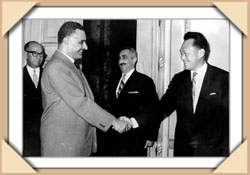|
Seeking support from Nehru, Nasser, Tito
To gain support for the new Malaysian federation, Lee travelled extensively to put his arguments personally to key leaders, such as Nehru, Nasser and Tito. This would help him establish a reputation for himself on the world stage
I DECIDED it was time to renew my contacts with British leaders, and to meet several Afro-Asian leaders on the way. In April 1962, I flew to London via Rangoon, New Delhi, Cairo and Belgrade.
Prime Minister Pandit Nehru of India fully supported my proposals to merge Singapore with Malaya and form Malaysia. I had good press. Under the caption, "Prime Minister's blessings for Malaysia secured", The Times of India, then India's journal of record, wrote that Malaysia had evoked appreciation in official circles.
It was obvious the Indians considered it a sound development because it would help to keep China's influence out of South-east Asia. At my press conference, I was able to tell journalists that their prime minister was not concerned about the Afro-Asian secretariat's declarations that Malaysia was neo-colonialist.
|

|
A big smile of welcome from President Gamal Abdul Nasser of Egypt in April 1962. |
|
|
My next stop was Cairo, from where the secretariat of the Afro-Asian Solidarity Committee issued its statements critical of Malaysia. If I could win President Nasser over, I would make an important breakthrough.
I arrived in the morning and was met at the airport by the vice-president and taken to one of ex-King Farouk's smaller palaces, now a guest house. That evening, I was received by President Nasser in his modest, unpretentious but well-appointed home.
It was a good meeting; the chemistry was right. When I arrived, he was at the front door with photographers in position. I felt he had done it hundreds of times, so photogenic did he look on television and in the papers.
All the same, he was most welcoming and friendly. His consul general in Singapore was a great supporter of mine and of Malaysia. He knew we did not want Singapore to become an Israel in South-east Asia, and had reported this to his foreign minister.
Nasser spent an hour listening to me on the dangers of Singapore going it alone and becoming the odd man out in South-east Asia, a Chinese entity in the midst of a Malay archipelago of about a hundred million people.
I did not want this. The answer was to reunite Singapore and the peninsula, with which it had been governed by the British as one unit for over a hundred years before they were separated. He needed no persuading that Malaysia was not a neo-colonialist plot and assured me that he would support it and that I could say so.
All through the five-day visit, the Egyptians laid out the red carpet for me. I was invited to visit Egypt again and see him at any time -- it was personal, Nasser said. I had made a friend. I liked the man, his simple lifestyle and his intense desire to change all that was decadent and rotten of Farouk's Egypt.
Nasser issued a joint communique with me, breaking protocol since Singapore was not an independent country. It said that he supported Malaysia and the "unification of all peoples with similar political and social backgrounds... seeking an end to colonial domination".
It was a political plus for Singapore to be understood and supported by Nasser and Nehru, the two leaders who then set the pace in Africa and in Asia.
On May Day, I flew to Belgrade. Tito received me formally. Unlike Nasser, he had a splendid residence, with electrically controlled steel gates that opened silently upon our arrival. I was taken to see him by a minister, Slavko Komar.
Tito wore a lounge suit, not one of his resplendent uniforms, and as the cameramen took pictures he looked firm and stern -- no smiles, no warmth, completely the opposite of Nasser. I was up against it: the Indonesians had poisoned his mind. But he listened.
I took time to explain my background, that I was a nationalist and not a colonialist stooge. I did not agree with the communists in Singapore who took their inspirations from China; they could not succeed in Singapore and Malaya because their brand of communism was not indigenous; Maoism could not succeed in South-east Asia.
I sensed from his body language that I had shifted him. I mentioned an article critical of Malaysia in their party publication, the Komunist. Tito said it did not represent the view of the Yugoslav government. I had gained my point.
When I was leaving for the airport and about to meet the press there, I asked Slavko Komar whether I could repeat what Tito had told me. He said the president was a man of his word, and when he had said it was so, it was so.
So I quoted Tito's statement and turned around to the minister to ask whether I was right. He nodded and said, "Yes."
After my departure, Reuters reported a foreign secretariat spokesman as stating "the article represents the personal opinion of the author. Premier Lee during his stay in Belgrade informed the president and Yugoslav leaders about desires to create a Malaysian federation, which were received with understanding by the Yugoslav side".
It was a plus.
SEP 27 1998
|